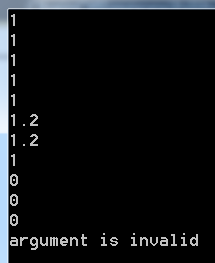boost中有一個lexical_cast可以用統一的方式來做基本類型之間的轉換,比如字符串到數字,數字到字符串,bool和字符串及數字之間的相互轉換。boost::lexical_cast的用法比較簡單:

c++11中缺少lexical_cast方法,但是c++11已經提供了一些基本類型轉換的方法,比如to_string, atoi, atof等等,但是我們不能通過一種通用的方式來做基本類型轉換,因此我希望做一個類似boost的lexical_cast做基本類型的轉換,這也是我們的c++社區的一個開發計劃。
由於c++11已經提供了一些便利的方法,我要做的事情就變得很簡單了,就是把他們糅合在一起並提供一個統一的lexical_cast的方法即可。
實現思路也很簡單,轉換主要有這幾種:1.數字到字符串的轉換;2.字符串到數字的轉換;3.bool與字符串的相互轉換;4.數字轉換為bool;具體的實現代碼如下:
#include <type_traits>
#include <string>
#include <cstdlib>
#include <algorithm>
#include <stdexcept>
#include <cctype>
#include <cstring>
using namespace std;
namespace detail
{
const char* strue = "true";
const char* sfalse = "false";
template <typename To, typename From>
struct Converter
{
};
//to numeric
template <typename From>
struct Converter<int, From>
{
static int convert(const From& from)
{
return std::atoi(from);
}
};
template <typename From>
struct Converter<long, From>
{
static long convert(const From& from)
{
return std::atol(from);
}
};
template <typename From>
struct Converter<long long, From>
{
static long long convert(const From& from)
{
return std::atoll(from);
}
};
template <typename From>
struct Converter<double, From>
{
static double convert(const From& from)
{
return std::atof(from);
}
};
template <typename From>
struct Converter<float, From>
{
static float convert(const From& from)
{
return (float)std::atof(from);
}
};
//to bool
template <typename From>
struct Converter<bool, From>
{
static typename std::enable_if<std::is_integral<From>::value, bool>::type convert(From from)
{
return !!from;
}
};
bool checkbool(const char* from, const size_t len, const char* s)
{
for (size_t i = 0; i < len; i++)
{
if (from[i] != s[i])
{
return false;
}
}
return true;
}
static bool convert(const char* from)
{
const unsigned int len = strlen(from);
if (len != 4 && len != 5)
throw std::invalid_argument("argument is invalid");
bool r = true;
if (len == 4)
{
r = checkbool(from, len, strue);
if (r)
return true;
}
else
{
r = checkbool(from, len, sfalse);
if (r)
return false;
}
throw std::invalid_argument("argument is invalid");
}
template <>
struct Converter<bool, string>
{
static bool convert(const string& from)
{
return detail::convert(from.c_str());
}
};
template <>
struct Converter<bool, const char*>
{
static bool convert(const char* from)
{
return detail::convert(from);
}
};
template <>
struct Converter<bool, char*>
{
static bool convert(char* from)
{
return detail::convert(from);
}
};
template <unsigned N>
struct Converter<bool, const char[N]>
{
static bool convert(const char(&from)[N])
{
return detail::convert(from);
}
};
template <unsigned N>
struct Converter<bool, char[N]>
{
static bool convert(const char(&from)[N])
{
return detail::convert(from);
}
};
//to string
template <typename From>
struct Converter<string, From>
{
static string convert(const From& from)
{
return std::to_string(from);
}
};
}
template <typename To, typename From>
typename std::enable_if<!std::is_same<To, From>::value, To>::type lexical_cast(const From& from)
{
return detail::Converter<To, From>::convert(from);
}
template <typename To, typename From>
typename std::enable_if<std::is_same<To, From>::value, To>::type lexical_cast(const From& from)
{
return from;
}
前後花了一個多小時,一個基本的類型轉換類就完成了,再測試一下吧,測試代碼:
void test()
{
cout<<lexical_cast<int>(1)<<endl;
cout << lexical_cast<int>("1") << endl;
cout << lexical_cast<long>("1") << endl;
cout << lexical_cast<string>(1) << endl;
cout << lexical_cast<bool>(1) << endl;
cout << lexical_cast<double>("1.2") << endl;
cout << lexical_cast<float>("1.2") << endl;
string s = "true";
cout << lexical_cast<bool>(s) << endl;
char* p = "false";
cout << lexical_cast<bool>(p) << endl;
const char* q = "false";
cout << lexical_cast<bool>(q) << endl;
cout << lexical_cast<bool>("false") << endl;
cout << lexical_cast<bool>("test") << endl;
}
int main()
{
try
{
test();
}
catch (const std::exception& e)
{
cout << e.what() << endl;
}
return 0;
}
測試結果:
